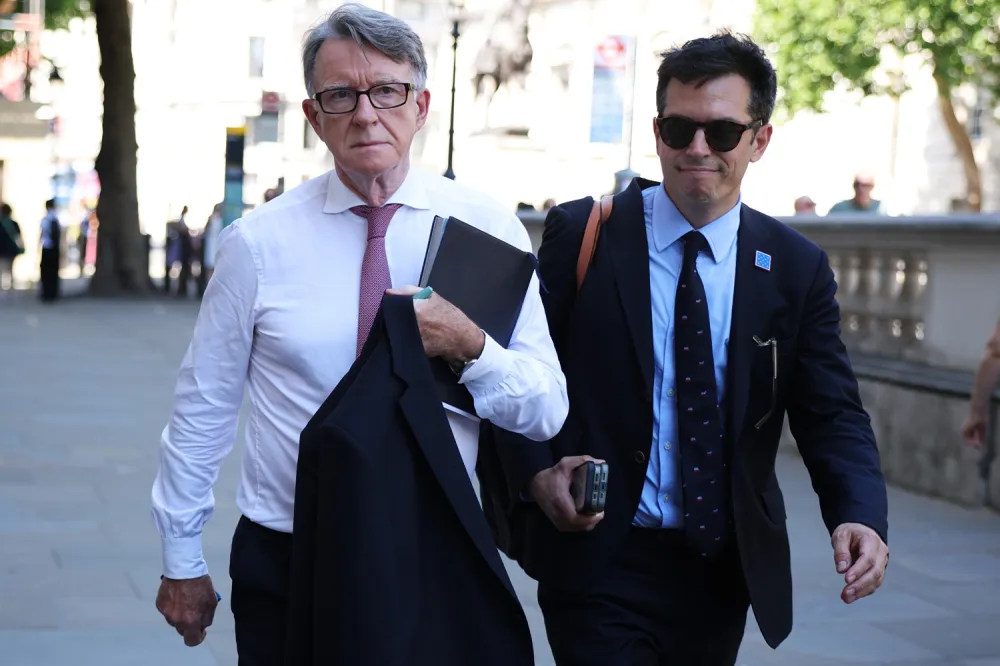On Thursday, after days of slow-dripping revelations of his excruciating communications with the deceased sex trafficker Jeffrey Epstein, U.K. Ambassador to the United States Peter Mandelson was finally dismissed by Prime Minister Keir Starmer from his role as Britain’s man in Washington. Scrutiny of their friendship had renewed following the release by the U.S. House Oversight Committee of an alleged “birthday book” gifted to Epstein for his 50th birthday, in which Mandelson calls him “my best pal,” shortly followed by leaked emails featuring Mandelson’s suggestion that Epstein’s first conviction was wrongful and should be challenged.
Mandelson has expressed regret over ever meeting Epstein, and for the hurt caused to Epstein’s victims, and is not accused of any sexual wrongdoing. But, as the old adage goes, political scandals in Britain are not discovered but merely noticed. Mandelson’s fraternizing with one of the world’s most notorious sex offenders has been known for some time. It was a massive political time bomb waiting to explode. His appointment was yet another catastrophic error of judgment by the beleaguered Starmer—one that may now endanger the U.K.’s relationship with an increasingly volatile White House.
The latest twist in the saga broke at the worst possible time. U.S. President Donald Trump is due in London for a state visit on Sept. 16, an event in which the former ambassador was set to play a leading role. The government was in a bind; if it sacked Mandelson beforehand, as well as creating a logistical nightmare, it would draw further uncomfortable attention to Trump’s own relationship with the disgraced financier—a subject the president is keen to avoid, with him and his staff referring to the well-documented ties as a “Democrat hoax” and “fake news.”
The alternative was to keep the diplomat in place, ensuring the occasion would be dominated by days of more trenchant coverage and awkward questions by the press, and perhaps the revelation of even more lurid details. The choice was unenviable, but entirely of Labour’s own making.
U.K. ambassadorial appointments, in contrast to the United States, are usually given to career diplomats, but Mandelson’s was a nakedly political choice. Previous U.K. ambassadors in Washington have been professional and experienced diplomats, but Mandelson was a veteran party operative and one of the key figures behind New Labour’s landslide victory in 1997.
Mandelson gave a somewhat undiplomatic answer to an inquisitive Financial Times reporter on the Epstein matter in February, shortly before taking up the ambassadorial role, saying: “I’m not going to go into this. It’s an FT obsession, and frankly, you can all f*ck off. OK?”
In Britain, Mandelson’s name is practically a byword for House of Cards-style political shenanigans. The press dubbed him “The Prince of Darkness,” a nickname that didn’t appear to trouble him. Four years into Tony Blair’s government, he had already resigned twice over scandals linked to wealthy businessmen. No sooner had Blair’s successor, Gordon Brown, brought Mandelson back into government in 2008, complete with a seat in the House of Lords, than reports broke of meetings with Russian oligarchs on yachts.
It may have seemed like a shrewd move to send an amoral expert in schmoozing rich egotists to Trump’s White House, but Mandelson’s hiring had little to do with his skill set and much more to do with rewarding a Labour tribal elder. Starmer’s chief of staff, Morgan McSweeney, is a protégé of Mandelson’s who was reportedly instrumental in gifting him the diplomatic post despite there being an ambassador already in place—Karen Pierce, a seasoned, effective, and jovial diplomat by all accounts well-liked by the MAGA crowd, including Trump himself.
Mandelson seemed to have ingratiated himself enough with the U.S. president, receiving praise and holding hands in the Oval Office, but now all of those efforts have turned to dust. Next week, Trump, in between riding in carriages and hobnobbing with the royals (though not fellow Epstein pal Prince Andrew), will keep being dogged by the story that refuses to die. The U.K. press pack, less deferential to politicians than its U.S. counterpart, will clamor for answers and Trump will bristle.
A scandal of this magnitude would always inflict damage. But for an already storm-battered and error-prone prime minister, it could be fatal. In recent months, Starmer has lost an anti-corruption minister to corruption allegations, seen a homelessness minister resign after making her tenants homeless, and has most recently been forced to reshuffle his cabinet after his housing minister (and deputy leader) was caught not paying sufficient tax on her house purchase.
The Labour Party had 14 years to prepare for government, looking on as the Tories descended into Brexit-fueled ineptitude and anarchy, only for them to quickly earn a reputation for their own bumbling chicanery. Before he swept to power last year, Starmer pledged a complete crackdown on cronyism, only to appoint Mandelson, the epitome of cronyism, to one of the most important diplomatic jobs.
Mandelson’s fall is most important to the countless victims of Epstein, who continue to be denied justice and see his pals and associates constantly escape punishment. But it also matters for democracy. Rewarding such a compromised man with high office and defending him to the hilt has a corrosive effect on public trust at a time when faith in institutions and rule of law is being eroded by disinformation and paranoia. When the rich and powerful are able to commit heinous crimes and hide in plain sight, it is little wonder that people drift toward conspiracy theories.
The Mandelson imbroglio has even achieved the previously unthinkable and stirred a moribund Conservative Party into deploying some effective attack lines. In Parliament on Wednesday, Kemi Badenoch, the titular leader of the opposition, roasted Starmer on the ambassador’s link to Epstein, demanding answers on the vetting process, calling for documents to be released, and asking what the prime minister knew and when he knew it. Starmer could manage little more than a meek assurance that full due process was followed in the appointment.
On Wednesday, the Times of London reported on a memo from 2002 in which Mandelson apparently urged Blair to meet Epstein when he was prime minister. Officials apparently blocked the planned release of these documents as they may embarrass Britain and disrupt U.S.-U.K. relations. Sky News now claims that Mandelson was appointed despite the concerns of the security services. Advisors may be sacrificed, but at this point the story becomes about Starmer’s waning authority. He may survive, but as an even more diminished figure.
And in the end, the net beneficiaries will be the hard-right populists led by Nigel Farage, already surging in the polls, who can use this fallout as further sign of mainstream decadence and degeneracy. Reform UK is even more morally compromised, corrupt, and elitist, just as yet politically untested. But thanks to another unforced error by Starmer, we are one step closer to seeing what even worse people in charge will be capable of.
The post Why Did Britain Send an Epstein Pal to Washington? appeared first on Foreign Policy.




